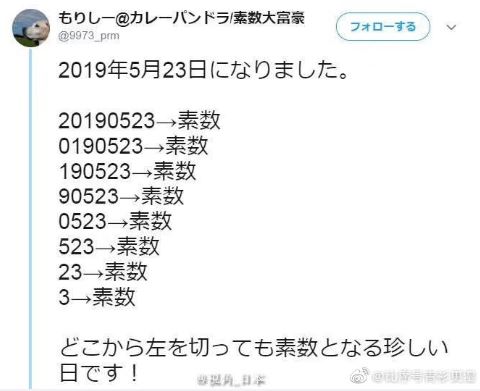The above picture is from Sina Weibo, showing May 23rd, 2019 as a very cool "Prime Day". That is, not only that the corresponding number of the date 20190523 is a prime, but all its sub-strings ended at the last digit 3 are prime numbers.
Now your job is to tell if a given date is a Prime Day.
Input Specification:
Each input file contains one test case. For each case, a date between January 1st, 0001 and December 31st, 9999 is given, in the format yyyymmdd.
Output Specification:
For each given date, output in the decreasing order of the length of the substrings, each occupies a line. In each line, print the string first, followed by a space, then Yes if it is a prime number, or No if not. If this date is a Prime Day, print in the last line All Prime!.
Sample Input 1:
20190523Sample Output 1:
20190523 Yes
0190523 Yes
190523 Yes
90523 Yes
0523 Yes
523 Yes
23 Yes
3 Yes
All Prime!Sample Input 2:
20191231Sample Output 2:
20191231 Yes 0191231 Yes 191231 Yes 91231 No 1231 Yes 231 No 31 Yes 1 No
#include<bits/stdc++.h> using namespace std; const int maxn=1010; int toInt(string st){ int sum=0; for(int i=0;i<st.size();i++){ sum=sum*10+(st[i]-'0'); } return sum; } bool isP(int n){ if(n<=1){ return false; } for(int i=2;i<=sqrt(n);i++){ if(n%i==0){ return false; } } return true; } int main(){ string s,str; cin>>s; bool flag=true;; int len=s.size(); for(int i=0;i<len;i++){ str=s.substr(i,len); int sum=toInt(str); if(isP(sum)){ printf("%s Yes ",str.c_str()); } else{ printf("%s No ",str.c_str()); flag=false; } } if(flag==true){ printf("All Prime! "); } return 0; }
